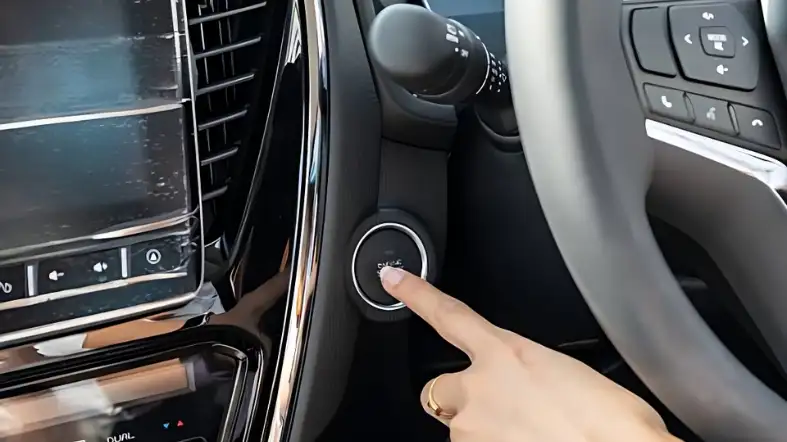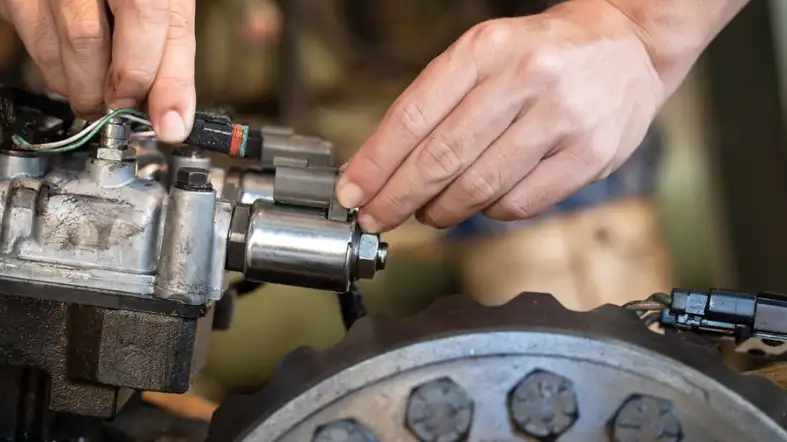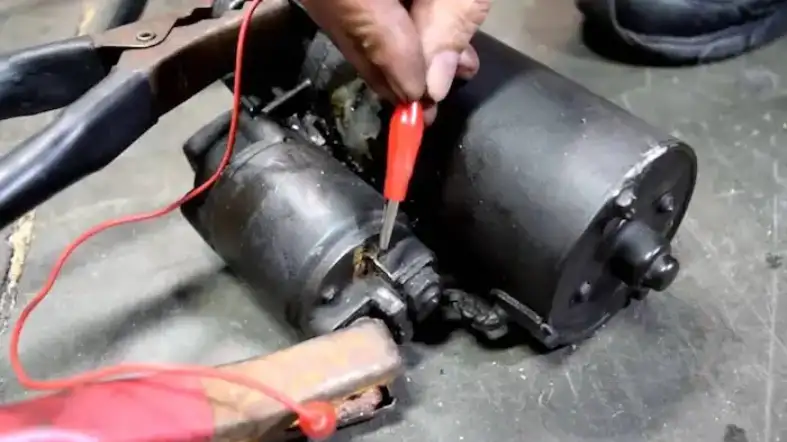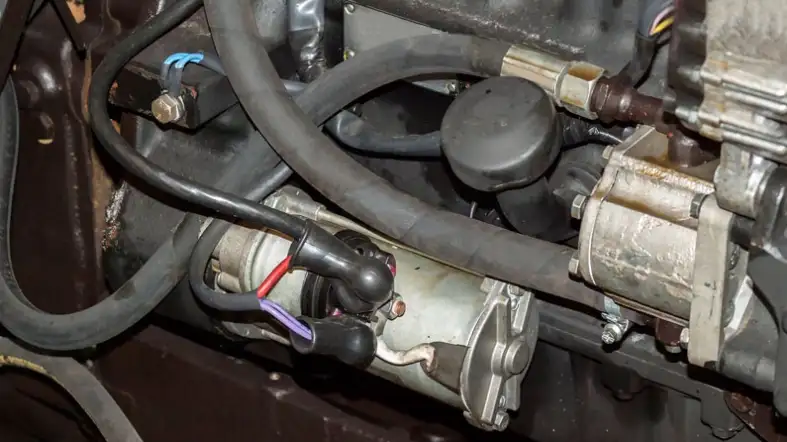Are you tired of dealing with frustrating electrical issues in your car? Have you considered that the culprit might be a bad starter?
Many car owners often overlook the potential impact a faulty starter can have on their vehicle’s electrical system, leading to a range of problems from dim headlights to a dead battery.
In this blog, we’ll dive deep into the topic of bad starters and explore the question: Can a bad starter cause electrical problems?
So, get ready to learn how this seemingly small component can have a big impact on your car’s electrical system.
can a bad starter cause electrical problems?
Yes, a bad starter can cause electrical problems in your vehicle.

When a starter malfunctions, it may draw too much power from the battery or create a short circuit, which can result in issues with the electrical system of the vehicle.
This can lead to problems such as dimming headlights, flickering dashboard lights, and a drained battery.
How a Bad Starter Can Cause Electrical Problems?
A bad starter can cause a variety of electrical problems in a vehicle, and here are some reasons why:
1. Drain on the battery:
A bad starter can create an unnecessary drain on the vehicle’s battery.
When you try to start the car, the starter might not turn over the engine properly, which can cause the battery to lose power quickly and die prematurely.
Additionally, a faulty starter can draw too much power from the battery, further contributing to the battery’s early failure.
2. Flickering headlights:
If you notice your headlights flickering or dimming when you attempt to start your car, it could be a clear indication of a bad starter.
The starter may draw excessive power from the electrical system during the starting process, causing a voltage drop.
As a result, the headlights may flicker or become dim as they are affected by the fluctuation in power supply.
3. Ignition switch issues:
The starter is connected to the vehicle’s ignition switch, and if there is a problem with the starter, it can lead to issues with the ignition switch as well.
A faulty starter might prevent the ignition switch from functioning correctly, resulting in difficulties starting the vehicle or even causing the car to stall unexpectedly while driving.
4. Wiring problems:
A bad starter can also create wiring problems in the vehicle’s electrical system.
The starter is connected to various electrical components in the car, and any fault in the starter can affect these components.
This can lead to malfunctions or disruptions in the electrical system, causing issues with various functions of the vehicle.
5. Overheating:
In addition to the issues mentioned above, a bad starter can also overheat, which can cause damage to other electrical components in the vehicle.
Overheating of the starter can have a domino effect, affecting nearby parts like the alternator.
The alternator is responsible for charging the battery and supplying power to the electrical system.
If the starter overheats, it can damage the alternator, leading to further electrical problems.
What are the Common Symptoms of a Bad Starter?

When the starter fails, the engine won’t start, and you may hear strange noises or experience other symptoms. Here are some common symptoms of a bad starter:
1. Clicking sound:
When you turn the key, and you hear a clicking sound, it’s usually an indication that the starter motor is not working correctly.
This sound can be caused by a weak or dead battery, a faulty starter motor, or a poor connection between the battery and the starter.
2. Grinding noise:
If you hear a grinding noise when you try to start the engine, it could be an indication that the starter gear is not engaging correctly with the flywheel.
This problem can damage the flywheel and other components if left unaddressed.
3. Engine won’t start:
If the engine won’t start at all, even after you’ve tried to jump-start it or charge the battery, it’s a strong indication that the starter is faulty.
The starter may have burned out, or the solenoid may have failed.
4. Slow cranking:
If the engine cranks slowly or takes a long time to start, it could be a sign of a bad starter. The starter motor may not be spinning the engine fast enough to start it.
5. Smoke:
If you see smoke coming from the starter, it’s a clear indication that something is wrong.
Smoke can be caused by an electrical problem or a mechanical issue, and it should be addressed immediately.
6. Dashboard lights:
If the dashboard lights come on when you turn the key, but the engine doesn’t start, it could be a sign of a bad starter.
The lights indicate that the battery has power, but the starter is not turning over the engine.
How to Diagnose a Bad Starter?

Fortunately, diagnosing a bad starter is a relatively straightforward process. Here are some key steps to follow:
1. Check the Battery:
Checking the battery is the first step in diagnosing a bad starter because a weak or dead battery can often mimic starter issues.
A fully charged and well-maintained battery is crucial for providing the necessary power to the starter motor. To check the battery:
a. Visually inspect the battery for any signs of damage, corrosion, or leaks.
b. Use a multimeter or voltmeter to measure the battery’s voltage. A fully charged battery should read around 12.6 volts. If the voltage is significantly lower, the battery may need recharging or replacement.
c. If you are not familiar with using a multimeter or unsure about the results, take your vehicle to a mechanic for a more accurate battery test.
2. Listen for Clicking Sounds:
When you turn the key to start the engine, the starter solenoid engages the starter motor.
A clicking sound during this process can indicate potential issues with the starter. Pay attention to the clicking sounds:
a. A single click followed by silence usually suggests a problem with the starter solenoid, the electrical connection, or a weak battery.
b. A rapid clicking sound typically points to a working starter solenoid but a faulty starter motor that is not turning.
3. Test the Starter:
Testing the starter directly can help confirm if it is indeed the cause of the starting problem. Here’s how you can perform a simple starter test:
a. Locate the starter motor under the hood of your car. It is usually situated near the engine and connected to the transmission.
b. Using a wrench or socket, disconnect the positive cable from the starter’s terminal. Ensure the vehicle’s ignition is off during this step.
c. Connect a jumper wire from the positive terminal of the battery to the positive terminal on the starter.
d. If the starter motor does not turn or crank when the jumper wire is connected, it indicates a faulty starter that needs replacement.
4. Check the Wiring:
If the starter did not turn over during the test, the issue could be related to faulty wiring rather than the starter itself. Inspect the wiring and connections:
a. Check for loose, corroded, or damaged connections between the starter and the battery. Ensure the terminals are clean and secure.
b. Examine the connections between the starter and the starter solenoid. Make sure they are tight and free from corrosion.
c. Verify the functionality of the starter relay, as a faulty relay can also prevent the starter from receiving power.
5. Get Professional Help:
If you are not confident in performing the tests or if the problem remains unclear after following the above steps, it is advisable to seek the assistance of a professional mechanic.
An experienced mechanic will have the necessary knowledge and diagnostic tools to identify the exact issue with the starter and other related components.
They can then make the appropriate repairs or replacements to ensure your vehicle starts reliably.
Avoiding unnecessary guesswork can save time and prevent potential damage to your vehicle.
How to Prevent Starter-Related Electrical Problems?

Starter-related electrical problems can be quite frustrating, leaving you stranded with a vehicle that won’t start.
Fortunately, there are some steps you can take to prevent these issues from happening in the first place. Here are some tips to keep in mind:
1. Regularly maintain your battery:
The battery is a crucial component of your vehicle’s electrical system as it provides the necessary power to the starter.
To prevent starter-related electrical problems, it’s essential to keep your battery in good condition.
Regularly inspect the battery terminals for any signs of corrosion or buildup and clean them if necessary.
Corrosion can impede the flow of electricity and affect the performance of the starter.
Ensure that the battery terminals are securely tightened to prevent any loose connections that might cause intermittent starting issues.
In addition to keeping the terminals clean, monitor the charge level of your battery regularly.
Modern vehicles often have battery indicators on the dashboard that display the battery’s charge status.
If your car doesn’t have such an indicator, consider using a battery tester or visiting a mechanic to check the battery’s health.
2. Replace your battery when needed:
Car batteries typically have a lifespan of around three to five years, depending on usage and conditions.
To prevent unexpected battery failure and starter problems, replace your battery before it reaches the end of its life expectancy.
If you notice any signs of a weak battery, such as slow cranking when starting the engine, dimming headlights, or difficulty starting the vehicle, have the battery inspected by a professional.
Early detection of battery issues can save you from being stranded due to a dead battery.
3. Keep your starter motor clean:
Dirt, oil, and debris can accumulate on the starter motor over time, hindering its proper operation.
Regularly inspect the starter motor and clean it using a wire brush or compressed air to remove any buildup.
Cleaning the starter motor not only helps prevent electrical issues but also extends its lifespan, ensuring reliable starting performance.
4. Check your ignition switch:
The ignition switch is responsible for sending power to the starter motor when you turn the key to start the engine.
If the ignition switch is faulty or worn out, it may not deliver the necessary electrical signal to the starter, resulting in starting problems.
If you experience difficulty starting your vehicle, especially if the battery is in good condition, have the ignition switch checked and replaced if necessary by a qualified mechanic
5. Avoid leaving accessories on when the engine is off:
Leaving electrical accessories, such as lights, radio, or air conditioning, running while the engine is off can drain the battery’s charge.
When the battery’s charge is low, the starter has to work harder to crank the engine, increasing the risk of premature starter failure.
Make it a habit to turn off all accessories before shutting down the engine to avoid unnecessary strain on the starter and the battery.
6. Use the correct starter for your vehicle:
Using the wrong starter for your vehicle can lead to electrical problems and potentially damage the engine.
Always refer to your vehicle’s owner’s manual or consult with a qualified mechanic to ensure you are using the recommended starter model for your specific make and model.
Using the correct starter ensures proper electrical compatibility and reduces the risk of starter-related issues.
7. Be aware of warning signs:
Being attentive to warning signs can help you detect potential starter problems before they escalate into complete failure.
If you hear unusual grinding or clicking noises when attempting to start the engine, this may indicate issues with the starter.
Additionally, if you experience frequent instances of the engine not cranking or starting slowly, it’s crucial to have the starter inspected by a professional promptly.
Early intervention can save you from costly repairs and prevent inconvenient breakdowns.
FAQs
Q: What Other Electrical Problems Can A Bad Starter Cause?
A: In addition to draining your battery and causing your electrical system to malfunction, a bad starter can also cause your alternator to fail.
This is because the alternator has to work harder to compensate for the extra load on the battery caused by the bad starter.
Q. Can A Bad Starter Cause A Car To Not Start At All?
A: Yes, a bad starter can cause a car to not start at all. If the starter has completely failed, the engine won’t turn over when you turn the key in the ignition.
Q. How Can I Prevent My Starter From Going Bad?
A: There’s no guaranteed way to prevent your starter from going bad, but there are a few things you can do to help extend its lifespan.
For example, make sure your battery is in good condition and that your electrical system is functioning properly.
You can also have your starter inspected by a mechanic regularly to catch any potential issues before they become serious problems.
Conclusion
A bad starter can indeed cause electrical problems in a vehicle.
The starter is responsible for initiating the engine’s combustion process, and if it’s not functioning properly, it can put a strain on the electrical system.
This can lead to issues such as dimming headlights, a weak battery, and even a complete loss of power.
It’s important to address any starter issues as soon as possible to prevent further damage to your vehicle’s electrical components.
By keeping your starter in good condition, you can ensure that your vehicle starts smoothly and runs reliably.
